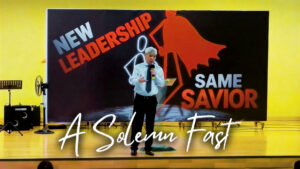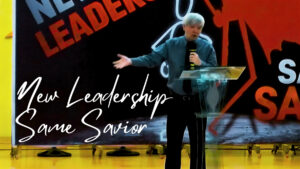by: Pastor Carlos Barcelona Jr.
KEY TEXT:
Deuteronomy 16: 15b- 17
“..because the LORD your God will bless you in all your produce and in all the work of your hands, so that you will be altogether joyful. Three times a year all your males shall appear before the LORD your God at the place that he will choose: at the Feast of Unleavened Bread, at the Feast of Weeks, and at the Feast of Booths(Tabernacles). They shall not appear before the LORD empty-handed. Every man shall give as he is able, according to the blessing of the LORD your God that he has given you.”
Illustration:
There was a man named, Jack Wugman walking down the beach one day. He saw an unusual glass bottle. He bent over and picked up the bottle. His life would be forever changed. There was a note inside from a man named Singer. He invented and perfected the sewing machine. Singer penned a note, “WHOEVER FINDS THIS BOTTLE SHALL INHERIT MY WHOLE ESTATE.” The judge validated the note, and Jack inherited millions of dollars from a man he never met.
You will not see any rolling bottle under your seats with an appointed riches but I do believe that God has appointments for each of our lives which when taken seriously will lead us to another level of blessings. These appointments originated with the Lord, himself. It was His desire to meet His people, on His terms and on His grounds of approach. They were His arrangements. The Lord was the Host and we are His guests, invited to commune with Him. And in keeping His appointments the believer will come to experience more of the blessings of God.
What can we learn from the 3 verses that we read?
I. THE APPOINTED BLESSINGS
The Bible is very clear, v. 15b“…because the Lord your God will bless you in all your produce and in all the work of your hands, so that you will be altogether joyful.” In the King James Version it says, “because the Lord thy God shall bless thee in all thine increase, and in all the works of thine hands, therefore thou shalt surely rejoice.” This message from God is a confirmation, a validation or endorsement of what God is going to accomplish.
Illustration:
There’s an old story of the boy who stood on a sidewalk, waiting on a bus. A man walking by spotted the boy, and gave him some gentle instruction. “Son,” he said, “if you’re waiting on the bus, you need to move to the street corner. That’s where the bus stops for passengers.”
“It’s OK,” said the boy. “I’ll just wait right here, and the bus will stop for me.”
The man repeated his argument, but the boy never moved. Just then, the bus appeared. Amazingly, the bus pulled over to where the boy stood, and the child hopped on. The man on the sidewalk stood speechless. The boy turned around in the doorway and said, “Mister, I knew the bus would stop here, it was arranged, because the bus driver is my dad!”
In the all-inclusive, perfect plan of the all-wise God, there is a season for everything, and a time for every purpose. Every purpose has its due date- an appointed time. The events of our life are not accidental. They are placed in due order. Each event has its own appointed season.
There is a time to be born, and a time to die. There is a time to plant, and a time to pluck up that which is planted. Just as there is a time to weep, there is a time to laugh. As there is a time to mourn, there is also a time to dance. There is an appointed time and appointed blessing.
There are special seasons when God satisfies His servants with everything that makes life rich and full and hurts no one else. The writer of the Book of Proverbs said: “The Blessing of the Lord makes rich, and He adds no sorrow with it.” Every good thing we enjoy in this material world that brings no sorrow to others is part of the appointed blessing of God, part of the happiness of His plan.
There are special seasons when God bestows on us the happiness of a sense of forgiven sins. We know that our past will not rise up to condemn us. We have the felt-sense of inner peace with God, and you know God loves you. Even the treasures of heaven seem to be opened to our business, career, family and relationships and divine healing just flow through our bodies.
Just as the song says:
Our fields are full at harvest
The rains have always come
Our table is a banquet
Our silos overrun
God has appointed seasons of blessings, of prosperity, of happiness for His people. And the very purpose of the appointed blessing is for every believer to experience joy.
E.g. Pastor Anelene was quite worried over the WVSU entrance exam result of Jenjen because she was not able to answer 20 questions. But I told her, your daughter will pass, God has already set it. A few weeks later the result came and Jenjen passed and can take any course she wants.
II. THE APPOINTED FEASTS
There are Three Major Feasts mentioned in verse 16.
These feasts were to be respected and honoured 3 times a year. It actually talks about the honour we should give to the Godhead: the Father, Son and Holy Spirit. The call to these feasts was a sacred call to every male Israelite because it was through these Festivals that they were reminded of what God has done for them.
What are these Feasts?
A. The Feast of Unleavened Bread (Passover)
The Feast of Unleavened Bread followed the Passover and lasted for a week. At the first Passover, the Jewish didn’t have time for the bread dough to rise and therefore they ate unleavened bread with the roasted lamb and the bitter herbs the night before they left Egypt.
The symbol of leaven or yeast has 2 significances:
1. The Natural Leaven: is a little bit of sour dough, and when placed in a batch of dough has the action of fermentation. Leaven puffs up. It works silently, secretly and gradually, until the whole is leavened. All the dough is affected by its mysterious operation and fermentation. It causes the dough to rise. Its influence permeates the whole until all is leavened, until all becomes like itself.
E.g. my experience of seeing how a pan de sal was made in Libertad.
2. The Spiritual Leaven: Leaven represents the sins that belong to the old life such as malice, wickedness and hypocrisy. It represents unbelief, compromise and was a picture of evil and corruption either in doctrine or practice. Though it is small and seemingly insignificant, it rapidly grows and infects the whole lump of dough.
Significantly, God called Israel to walk unleavened after their initial deliverance from Egypt which symbolizes their call to a pure walk with the LORD. The purity of the feast of Unleavened Bread followed the blood-deliverance of Passover. It relates to the time of Jesus’ burial, after His perfect, sinless sacrifice on the cross, during which He was received by God the Father as holy and complete, perfectly accomplishing our salvation. It signifies that we can only walk in purity before the LORD after we have had the blood-deliverance at the cross. Like the Jews on Passover night in Egypt, we are a pilgrim people, ready to be called out and we must not be encumbered by sin.
B. The Feast of Weeks (Pentecost)
This feast is known by different names:
The Feast of Harvest – Exodus 23: 16
The Feast of Weeks – Exodus 34: 22
The Day of Firstfruits – Numbers 28: 26
The Feast of Weeks of the Firstfruits of Wheat Harvest – Exodus 34: 22
The Feast of Harvest, the Firstfruits of Israel’s labors – Exodus 23: 16
The Feast of Pentecost, in the New Testament.
It was a feast associated with the joy of harvest, during which the Israelites brought a freewill offering unto the LORD, as a demonstration of thanksgiving in their heart. There was a great harvest unto God, and great thanksgiving for that harvest.
There was no ritual of sacrifice commanded. The response to God on the day of Pentecost was not done out of obligation to a particular law. It was a time of joyful thanksgiving and heart-response of God’s people unto Him.
The Greek name for this feast is known as “Pentecost”, simply meaning “fiftieth”. A study of this feast points to the coming of the Holy Spirit to form the church of Jesus Christ, and write upon the hearts and minds of the believers the New Covenant commandments. No atoning sacrifice was necessary because the price had already been paid by Jesus. This is a powerful picture of the work of God in the New Covenant, fulfilled at the Day of Pentecost.
C. The Feast of Booths (Tabernacles).
The Hebrew word for “Booth” is “Succoth”. The feast of booths pointed back to Israel’s first encampment after they came out of Egypt, as they encamped on the edge of the wilderness. The booths spoke of temporary dwelling place going to the promise land.
The Hebrew word for “Tabernacle” is “Sook-kaw” which means “a hut or nest”. The custom took place when all of the harvest was gathered in. The Israelites were to take parts of goodly trees, palm, willow, olive, pine, myrtle, as well as other trees and make booths out of them. They were to leave their houses, or else build them on the roofs of their houses and rejoice in these booths for seven days before the Lord.
With the harvest gathered in, they look back over the labors of the year, all because of the blessing of the Lord in sending the rains. It was also a time to rejoice in God’s deliverance and provision for Israel during their time of wandering. It was a time when having come into the Promised Land, looking back with gratitude on all God had done to deliver and provide for them in their tough times. The Feast of Booths or Tabernacles was the most joyous season of the year. It was all about celebration, rest and refreshment, remembering what God had done.
Both the Feast of Pentecost and Feast of Tabernacles have one thing in common: They were to rejoice and share the blessing with their son, daughter, manservant, maidservant, the Levite within the gates, the stranger, the fatherless and the widow. They blessed others with their blessings.
III. THE APPOINTED PEOPLE
It was to a redeemed people, redeemed from slavery of Egypt and separated unto the Lord that the instructions were given. Israel was a people near unto the LORD. The feasts were not given to any Gentile nation and the only way any Gentile could participate in the Festivals was to become a proselyte to the faith of Israel in the one true God. It is only by being in a covenantal relationship with the Lord Jesus could one enjoy His appointed feasts.
Deuteronomy 16: 16a “Three times a year all your males shall appear before the LORD your God at the place that he will choose.”
In Exodus 34: 24- “For I will cast out nations before you and enlarge your borders; no one shall covet your land, when you go up to appear before the LORD your God three times in the year.”
The Lord gave the nation a great promise of preservation if all the males would keep the set Feasts. He promised that He would cast out enemy nations before them and enlarge their borders. He also promised that no enemy would desire their land when they went up to keep these Feasts in the set times of the year. Therefore all the males had the assurance that their inheritances and their families would be looked after by the Lord while they attended the Festivals. Nobody has to fear the enemy attacks on their lands or households.
The Male here is used to represent headship, representing the whole family before God. The husband is the head of the wife and the children. He symbolizes love and care, protection and provision, authority and responsibility for his family before the Lord. He would come to the feast, learn the ways of the Lord and in turn take it back to his family and teach them diligently what he had learnt.
In the natural sense, there is the family order of the husband and wife and children. It is the responsibility of the husband to take the spiritual leadership and oversight as priest in his home. It is his responsibility before the Lord to instruct and teach his wife and family the things of God as found in the great Festival occasions.
But in the spiritual sense “in Christ”, there is neither male nor female, and every New Testament believer is to keep the Feasts. Galatians 3: 28 “There is neither Jew nor Greek, there is neither slave nor free, there is no male and female, for you are all one in Christ Jesus.” You may be a father or a mother, a husband or a wife, a son or a daughter, a businessman, a student, a professional, a minister, a leader, who has been instructed, delegated and promoted by the Lord or somebody who has been given spiritual leadership and oversight. We are all God’s new covenant people and therefore we are appointed to keep God’s appointments. We are God’s appointed people. We are called to walk in purity symbolized by the Feast of Unleavened Bread, demonstrate thankfulness through our free-will offering symbolized by the Feast of Weeks and look back with gratitude upon God’s goodness in our lives represented by the Feast of Tabernacles.
IV. THE APPOINTED GIVING
When the males came to appear before the Lord and keep the Feasts they were to appear before Him in three conditions: “They shall not appear before the LORD empty-handed. Every man shall give as he is able, according to the blessing of the LORD your God that he has given you.” v.16b, 17.
We are all temporary, our life is for a moment, our properties fade, even our money loses value. But even then, giving is God’s appointment that we need to understand and believe.
1. Giving is an ambition. It is like a desire that can become intense when propelled.
For the Israelites, none could be excused for coming empty handed because all had the blessings of the Lord on their lands and inheritances. The free-will offerings were simply the evidences of God’s blessings on them.
Many of us also have the evidences of God’s blessing in our lives. We don’t only have what we needed but we have what we wanted. We received our reward because of our hard work.
We did everything to reach our desires and ambitions. And therefore it will be impossible and unreasonable when we do nothing about our giving.
Illustration:
Eric Hulstrand was preaching one Sunday, an elderly woman, Mary, fainted and struck her head on the end of the pew. Immediately, an EMT in the congregation called an ambulance. As they strapped her to a stretcher and got ready to head out the door, Mary regained consciousness. She motioned for her daughter to come near. She was summoning her strength to convey her final words. The daughter leaned over until her ear was at her mother’s mouth. ‘My offering is in my purse,’ she whispered.”
To appear before God empty handed is an evidence of selfishness. If we cannot give to God, we cannot give God.
2. Giving is an ability. The more we practise it the more it improves.
To solve mathematical problems is an ability. To dance effortlessly is an ability. To sing like a nightingale is an ability. To handle children is patience and ability. To mix paint and do painting is an ability. To sleep with eyes wide open is also an ability. God created us with abilities and giving is one that we need to practice in order to serve.
It is possible, however, to get so caught up in what we call our spiritual gifts that we might not survive servanthood. The key is not so much to identify what we have but to use what we’ve been given. God gives each of us special abilities and expects us to be faithful in using what we have been given. Instead of “hiding” our gifts, we are to invest them in kingdom service to the fact that we are responsible for what we have been given.
We must recognize that we are co-workers with God in accomplishing His purposes by working in order to have so that our needs can be met, and by working in order to give so that God can meet the needs of others through us.
3. Giving is accordingly.
The proper way to view our possessions is that they are a trust given by God that we are responsible to manage. Everything belongs to Him and we are to serve as stewards whether we are blessed with a lot or with a little.
That’s exactly what we do when we practice the joy of biblical stewardship we give back to God that which is His in the first place. Friends, we’ve never given God one thing. When we make an offering or a tithe, we’re giving what He already owns.
CONCLUSION:
You are God’s appointed people and He has a blessing, a feast and giving appointed to us. It is not an accident why you have been blessed. Your appointed blessing is for an appointed giving. You have been blessed to bless.





